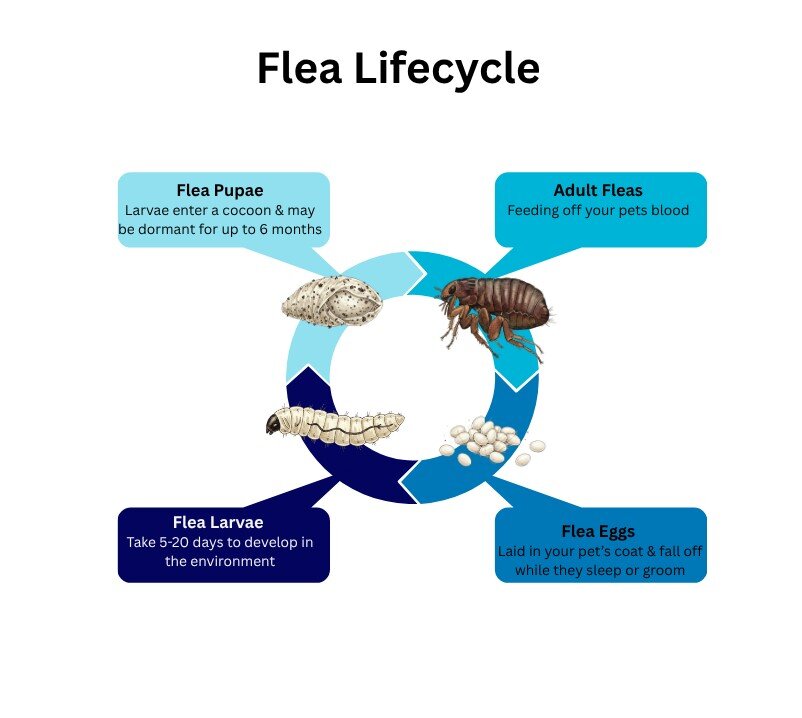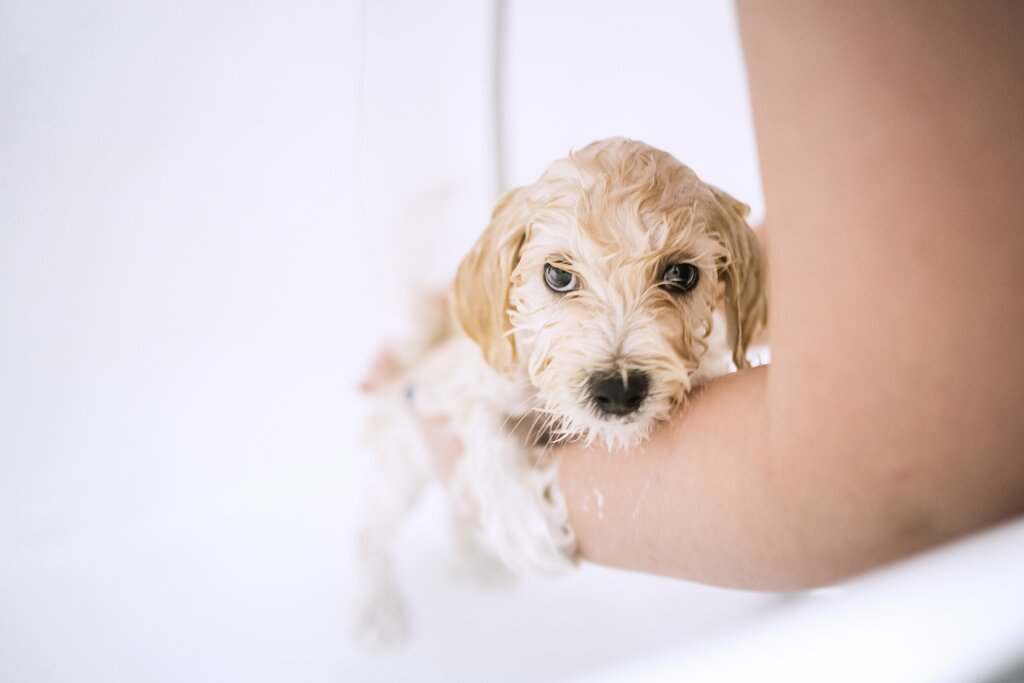Last Updated: 20/10/2025
How To Get Rid Of Dog Fleas
Does your dog have fleas? Even if they have already had treatment? Read more from our vet team on how to get rid of the fleas for good.
Author: Dr Teagan Lever BVSc (Hons)
Reading Time: 12 minutes - short read
Is your dog suddenly super itchy and scratching like there is no tomorrow? Chances are it is probably fleas.
Fleas can cause your pooch to tear themselves apart from scratching, and in the case of those who are allergic it only takes the bite of one to set them off. In some cases flea infestations can result in skin and ear infections from skin inflammation, plus fleas can also transmit flea tapeworm, and in severe cases cause anaemia from chronic blood loss.
The good news is that flea infestations are very treatable if you use the right approach. Before calling the pest exterminators, try out the steps below for a flea free life!
Why are fleas so tough to eliminate?
Suprisingly, 95% of the flea lifecycle actually occurs off your dog, which means that any adult fleas you are seeing are just the tip of the iceberg.
What happens is, adult fleas live on the dog, feeding on blood and laying eggs in the fur. These eggs drop off in areas where your dog sits or sleeps and hatch into a larval stage. The larval stage then burrows down and encases itself in a cocoon to become the pupal stage, which can lie dormant for up to 6 months! Once stimulated by vibrations and movement nearby, the baby flea hatches from the cocoon and jumps onto a nearby dog, cat or unsuspecting human!
When a female flea lays up to 50 eggs a day, it means that one flea can become one million fleas in as little as 6 weeks! This is why year round prevention is so important.
If you're unsure if fleas are the cause of your dog's scratching, read through our guide to How to tell if your dog has fleas.

Choosing the right flea preventative

The good news is that with the right preventative on board, no dog needs to put up with fleas, and there are heaps of options to choose from!
Depending on where you live and the other preventative products you use, you may want to go with a flea only product or a combined product which covers ticks and/or worms as well.
Top recommended flea preventatives for dogs
Flea treatment trouble shooting
As well as being persistent, there are some other bases to cover if you are still seeing fleas on your dog:
- Weigh your dog to make sure the treatment is the right dose to be effective.
- For spot on treatments, be sure to follow any instructions about bathing and water exposure closely as this can reduce effectiveness.
- Treat all the pets in the house for fleas. Untreated cats and dogs can harbour egg laying fleas which continue to top up the environmental flea population.
- Treat the environment to reduce the number of eggs, larvae and pupae. See below for more details.
I've used a treatment and I'm still seeing fleas!
There's nothing worse than feeling like you've just given your pet a treatment that hasn't helped, but don't be discouraged. Most likely the treatment has been effective, it's just that as quickly as adult fleas are being killed by the treatment, there are pesky new juvenile adult fleas jumping on and hitching a ride. Depending on the product you are using, it can take some time for these fleas to die, so the fleas you are seeing are these juveniles which are on the equivalent of flea death row.
With an effective and long acting flea treatment on board, your dog will work as a flea killing machine destroying all the adult fleas in their path. No new flea eggs will be laid, so over time the levels of flea larvae and pupae in the environment will drop off and there will be less reinfestation. Another reason it pays to be persistent and keep up that treatment year round! If your dog is particularly sensitive to the fleas or there is a heavy infestation in the environment, you can add Capstar, a short acting 24 hour treatment which kills fleas super fast, when you see fleas in the coat for some quick relief.
Old-school vs. modern approaches: What works and what doesn’t

Do flea powders and shampoos work on dogs?
In the old days, before we had access to so many new safe and effective spot on and oral worming treatments, pet parents had to rely on flea powders and shampoos. The trouble with these is that as well as sometimes containing some risky chemicals, they are only effective at killing the adult fleas for a very short period of time. This means that although they may reduce the fleas you can see on your pet for a day or two, they don't have a significant effect on the 95% of the flea population which lives off your pet in the environment, and so the problem continues.
Natural remedies for flea control
There are a range of natural remedies that have been claimed to treat and control fleas, such as garlic, vinegar, salt water and tea tree oil. As well as not being scientifically proven to have any effect, these methods can also harm your pet by causing gastrointestinal upset, or worse- garlic and tea tree oil are toxic to dogs, and vinegar and salt water can be dangerous in large quantities. We strongly advise using a registered and tested product that is specifically formulated to target fleas to ensure both your pet's safety and a quicker path to a flea-free home.
Treat the environment and other pets
Eggs, larvae and adult fleas will drop off your pet into surrounding areas of the house. If you have an infestation of fleas, you will need to wash their bed, blankets and stuffed toys. Use a hot wash (60 degrees celsius) with regular washing detergent and if possible, place items in the dryer on a hot cycle. Carpets will need to be vacuumed or steam cleaned. The vibrations from vacuuming will help to stimulate the pupae in the environment to hatch so that you can suck up the adults before they get a chance to bite!
You can use flea bombs to kill the parasitic trespassers in your home. Flea bombs are for the environment only and are not to be used to protect humans or animals. Always follow the safety directions carefully on the label when using a flea bomb.
If you have multiple pets in the house, dogs and cats, treat all of them. Treating one of or half your pet population will not be enough. When you give your dog a flea treatment, it treats your dog, not the environment. Untreated pets will be a breeding ground for fleas which will just transfer to the environment causing another infestation.
Flea FAQs
While fleas are an unwelcome guest in any home, following the steps outlined in this article will ensure you're quickly on your way to eliminating them for good. Breaking the flea life cycle by using effective flea treatment, thoroughly cleaning the environment and treating any other pets in the household are key ways to get on top of a flea infestation, while ongoing, year-round flea prevention is crucial to ensure that your pet and home will remain flea-free.
For a more comprehensive guide on the flea treatments currently available, as well as some points to consider when selecting a flea preventative, see our article on Best Flea and Tick Treatments for Pets.
Articles recommended for you
Our vet authored guide to the benefits of feeding your dog fresh food plus tips and advice for introducing it into their regular menu.
See our guide to protecting your pet from parasites from our vet team.
Thinking of getting a fish? Check out our guide for setting up a tank and home care tips!
Looking to understand horse feeds better? This comprehensive guide covers feeding recommendations for horses of all ages and disciplines.
Does your pet suffer from anxiety? Check out our Vet-guide for treatment options to help your pet.
History
Our experts continually monitor the health and wellness space and we update our articles when new information becomes available.
Mon Oct 20 2025
Edited by Dr Belinda Stancombe BVSc (Hons)Dr Teagan Lever BVSc (Hons)
Head Veterinarian, BVSc (Hons)
Pet Circle's Head Veterinarian, Dr Teagan graduated from the University of Queensland in 2010 and went on to work in small animal and mixed practice in various locations around QLD & ACT before joining Pet Circle in early 2016. Dr Teagan has special interests in dermatology, nutrition and preventative health care. She feels privileged to witness the special bond people share with their pets on a daily basis and enjoys forming lasting relationships with pet parents and their fur children.

